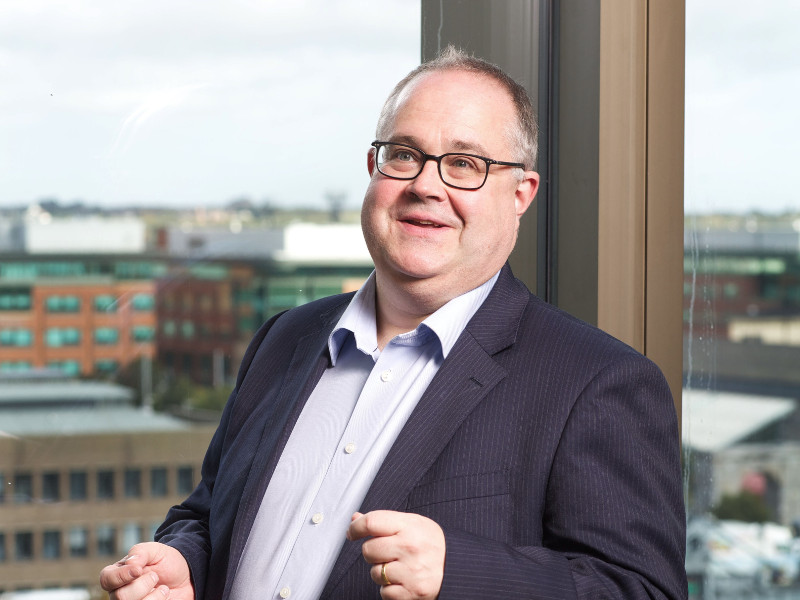Having led Dundalk and Belfast life sciences player Diaceutics from start-up to successful IPO, CEO Peter Keeling tells John Kennedy how revolutionising lab testing could be a game-changer for people fighting cancer and other diseases.
Six months ago, I spoke to Diaceutics’ CEO Peter Keeling on the occasion of the company’s IPO on the London Stock Exchange, raising £17m (€19.5m) on day one, with a market capitalisation of £53m.
Keeling was breathless, electrified and emotional as he said the Diaceutics story was “a story of our employees” as well as an unswerving belief in increasing the effectiveness of testing at lab stage to lead to better and faster treatments for more and more people.
“The IPO allowed us the opportunity to say we are regulated and here are our accounts. It also says to the pharma giants that we are committed to being there for the long haul as they build out bigger and bolder projects”
Today (9 September, 2019), Diaceutics reported a robust H1 with revenues up 34pc to £4.4m and a balance sheet with net cash of £14m in the bank.
Crucially the company has developed a “data lake” representing 126m patients in 19 countries and supporting 38 therapy brands in 16 markets, up 73pc year-on-year.
Talent has no borders
When I catch up with Keeling it is a busy afternoon in Dublin and our preamble starts with Brexit. “For 13 years I’ve been both sides of the border. It is wrong to say that talent is only Ireland or Northern Ireland, for us it is universities and bringing that talent in from wherever, whether it is UCD or Queen’s. Talent has no borders,” he says emphatically.
“Good testing can transform people’s lives as we’ve seen with HIV. It can be done”
A seasoned pharma industry executive who has also tasted the bitter taste of failure in his time, for Keeling Diaceutics is the “confluence of all the experiences I have had beforehand.”
He cut his teeth in nations like Egypt and Indonesia, gaining an intimate understanding of how pharma and government interact. “While in Egypt it was lamentable how a $9 eye ointment that could have prevented blindness cost an individual the equivalent of a month’s salary. So, I had to work with government and find a way to bring that price down to $1 when you take into account the ecosystem of doctors, regulators, the military – it was about managing that ecosystem.
“What I learned to love was how the power of the pharma model can change how diseases are treated. I grew up in an era where HIV went from being a death sentence to where it is today: a managed disease for people living long lives. And that has happened through investment in better testing and drugs.”
Keeling didn’t catch the entrepreneurial bug until he was into his 30s when he took a year out and spent it at MIT in Boston. “I came to the conclusion that it was a greater emphasis on how we are testing patients and proving how we are testing patients that could lead to more rapid and appropriate treatment for patients earlier in their journey.”
His first start-up focused on diagnostics for sexually-transmitted diseases failed after the first few years, which he chalks down to his own lack of experience at starting companies and being over-exposed to venture capital. It was 2003 and he was exhausted.
But still he held onto a belief that the pharma ecosystem model could be better employed alongside testing to treat patients more accurately, faster.
He spent a further year developing an economic model that centred on treating patients earlier, resulting in better financial rewards for the pharma industry.
Testing the market
He brought his economic model to a medtech conference in Miami and while presenting saw the number of people in the room dwindle from 50 down to seven. At the end of his talk, an executive from Glaxo-Smithkline said they liked the idea, but could Keeling make it operational.
“There was me with wet business cards and an idea, and I said of course.”
What Keeling had to do next was harness all of his experiences in pharma, diagnostics and testing and build a company.
“I look back on it and that belief came from all of those experiences. But eventually, I just think you become the sum total of those experiences and everywhere from the person denied the expensive eye ointment to the systems in place to support mechanism to idea from MIT to then starting a company, I look at Diaceutics and I’m 59 this year and it has taken 13 years to get to this point. Could I have done it faster and brought this idea forward 15 years ago? No, I think you need to have those sets of experience.
“I find myself in the perfect storm of all of that information and I believe it because I’ve been there. Good testing can transform people’s lives as we’ve seen with HIV. It can be done.”
Diaceutics’ business model is a combination of harnessing big data to crunch data and putting “boots on the ground” in the form of technicians in the various labs. “The lab for us is the frontline way of changing testing and then let’s use the data to measure how impactful that is and close that loop.”
The company is initially focused on cancer treatments and therapies. “The reason we are focused on cancer is that 80pc of drugs coming to market today that need to be tested are cancer-related, but there are other diseases like MS that we are also working on.”
At the time of our interview Keeling said that Diaceutics is involved in labs that are currently involved in 70pc of all cancer-testing in 19 countries.
“Our data allows where most likely to send samples for accuracy and at the same time inform sub-optimal labs how to do a better job. Our data is evidence of what is happening on the ground and pool the data to show the evidence to fix it. That’s what has always been missing. People were guessing this stuff. And we shouldn’t guess, we should gather the data and see what is going on.”
Keeling uses the analogy of a subway map to explain how with the right evidence doctors can find better, more optimal routes to get to more effective treatment of patients.
“We’ve worked on 178 therapies so far and more than a third of these have already made it to market. Traditionally it takes about five years to get diagnostics on half of the patients. We are reducing that to about two and a half years and I believe we can reduce that to months by joining up all of the systems.”
Walking with giants
Keeling believes the IPO route for funding is not for every business, but he also believes more Irish businesses should consider it.
“One of our reasons was the world we are working in. Even though we are a small company in Ireland, we are walking with giants. If those giants want to trust us they need to see a level of transparency.
“The IPO allowed us the opportunity to say we are regulated and here are our accounts. It also says to the pharma giants that we are committed to being there for the long haul as they build out bigger and bolder projects.”
Diaceutics’ staff levels have jumped from 60 to around 100 since the IPO and Keeling said that three-quarters of the company is owned by its employees. “We are competing with companies like Google for talent and we want people who are passionate as we are about changing the paradigm in how cancer is treated. I will fight tooth and nail to ensure that people we bring in share in that journey.”
Another aspect is future funding. “We want investors who can take a long-term view of growth and be there for us when we need to go to the next stage.”
Finally, I ask Keeling where he sees the future of Diaceutics. “I believe passionately that the future requires getting patients involved in the conversation. At the moment, it is an industrial discussion between labs, us and diagnostics companies. Why can I order a taxi on my smartphone and yet I can’t go to the doctor and say these are the 10 tests I want you to test me on?”
Ultimately, Keeling wants to see a paradigm change in funding testing and treatments.
“The pharma industry would make more money and kudos by enabling patients to get tested faster because that will get them onto the right treatment and drugs faster,” he concludes.
“There are impediments to all of this, of course, but I believe that’s what’s in my destiny – pharma pays for testing, the labs at the frontline are ready for testing and patients are walking in, informed and saying ‘this is what I want’.”
Click here to take your business to the next level
Written by John Kennedy (john.kennedy3@boi.com)
Published: 9 September, 2019






